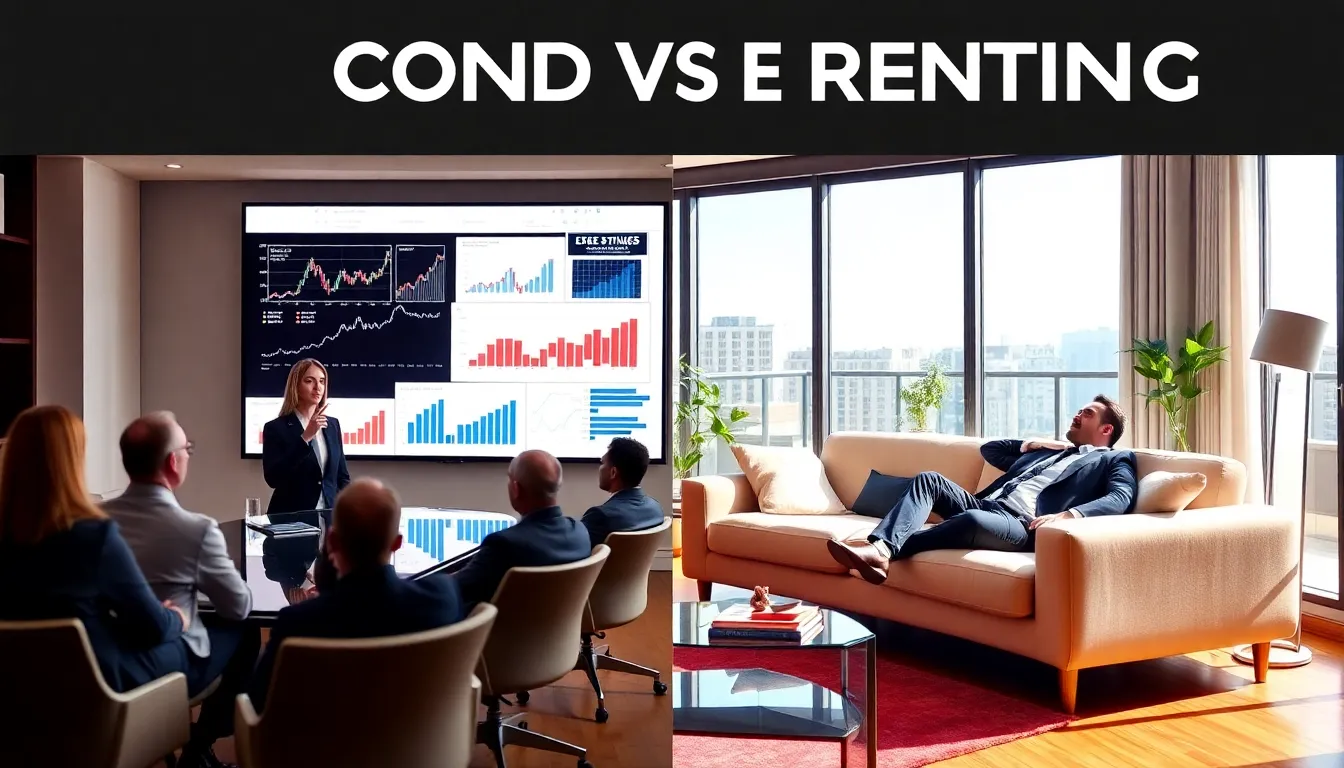Navigating the world of housing can feel like flipping a coin, heads, you buy a condo: tails, you rent. With rising real estate prices and ever-shifting rental markets, the choice between buying and renting isn’t just a simple decision. It’s a complex game of financial chess that can either cha-ching or cha-ching-not. Let’s jump into the nitty-gritty of buying a condo versus renting to help you make an informed, thoroughly amusing choice.
Table of Contents
ToggleUnderstanding The Market

Before diving into the condo-buying sea or renting ocean, it’s wise to understand the ebb and flow of today’s real estate market. Prices fluctuate like a yo-yo, influenced by economic trends, interest rates, and even seasonal demand. In regions where demand outstrips supply, buying a condo might seem like the golden ticket. Conversely, in areas saturated with rental options, renting might just be the way to go. To navigate this landscape, one must stay informed, not just about average prices but also about local economic indicators that could affect long-term investments. Researching areas that have potential for appreciation can paint a clearer picture of future returns for buyers.
Advantages Of Buying A Condo
Buying a condo has its perks, and they might just charm the socks off anyone considering it.
Long-Term Financial Benefits
Owning property is often likened to a steady climb up a financial mountain. Over time, equity builds up, and it could yield significant returns once sold. Unlike that slow drip of money spent on rent each month, condo ownership turns payments into potential investment gold.
Stability And Control Over Living Space
When you buy a condo, you’re not just getting walls and a roof: you’re gaining a sense of stability. You decide on upgrades, colors, and even if you want to raise a tiny flock of ornamental chickens in your backyard (well, hopefully, that meets HOA approval.). You’re the captain of your own ship, and that’s a liberating feeling.
Potential Tax Benefits
Let’s not forget the tax implications. Homeowners can deduct mortgage interest, property taxes, and other ownership-related expenses. Those deductions can turn out to be a silver lining on the financial cloud, eventually lightening the tax load.
Disadvantages Of Buying A Condo
Before you run out to the nearest real estate agent, let’s pump the brakes and consider the flip side of condo ownership.
Upfront Costs And Financial Commitment
The initiation fee into the condo club isn’t for the faint of heart. Down payments require hefty investments, and that’s just the tip of the iceberg. Closing costs, inspections, and insurance can add a dash of anxiety to the adventure. It’s essential to calculate whether the long-term benefits outweigh the upfront bite.
Maintenance Responsibilities
After purchasing that dreamy condo, the responsibility for maintenance shifts onto the homeowner. From leaky faucets to the dreaded HVAC breakdown, the owner must cover the costs for repairs, unless one is particularly skilled at DIY.
Market Risk And Resale Value
The condo market can be a wild ride. Factors like neighborhood changes, the economy, and overall demand can impact the resale value. Unexpected downturns can leave some homeowners with a bitter taste of regret.
Advantages Of Renting
Now, let’s pivot to the world of renting, which often gets a bad rap but has its own unique set of benefits.
Flexibility And Mobility
Renting can be the ultimate power move for the wanderer in all of us. It provides an easy escape route when life changes, be it a new job across the country or a spontaneous decision to backpack through Europe. Renters can seek new horizons with just a two-month notice.
Lower Upfront Costs
Dipping your toes into the rental pool involves a much smaller financial commitment. Security deposits and first-month rent are likely much lower than a condo’s down payment, making it easier for those who prefer to keep their savings intact while living their best life.
No Maintenance Responsibilities
When it comes to maintenance, renters enjoy a significant perk, no need to fix a thing. Just call the landlord or Property Manager, and they’ll handle it. This can free up time and money that would otherwise go toward hammers and wrenches.
Disadvantages Of Renting
Renting isn’t all sunshine and puppy dogs. It has its fair share of struggles that potential renters should consider.
Lack Of Equity Building
Unlike condo buyers, renters miss out on the chance to build equity. Payments flow to the landlord like water disappears down a drain, leaving no financial return at the end of a lease. It’s a one-way ticket into funding someone else’s property investment.
Potential Rent Increases
While one year might feel smooth sailing, the next could spell trouble. Landlords can increase rent when least expected, creating budgetary disruptions. Renters often find themselves battling inflation without the benefits of equity growth.
Restrictions On Customization
Decor enthusiasts may feel stifled by rental agreements. Many landlords limit customization options, leaving renters with no ability to put their personal stamp on the space. Want to paint that bright yellow accent wall? Better check with your landlord first, unless you enjoy losing your security deposit.
Making The Decision: Factors To Consider
Choosing between buying a condo and renting boils down to personal circumstances. Here are a few crucial factors to ponder before taking the plunge.
Personal Financial Situation
Every choice starts with a look in the mirror. Is your financial situation stable? Can you comfortably manage both a mortgage and other living expenses? Solid financial footing can sway the decision.
Length Of Stay And Future Plans
How long does staying in one place appeal to a person? If the answer is three years or more, buying a condo may be a wise move. If career or other life changes loom in the near future, renting could prove less taxing.
Lifestyle Preferences
Finally, one’s lifestyle plays a vital role. Does the freedom and flexibility of renting appeal more than the stability of condo ownership? Each option carries unique advantages tailored to different lifestyles.








